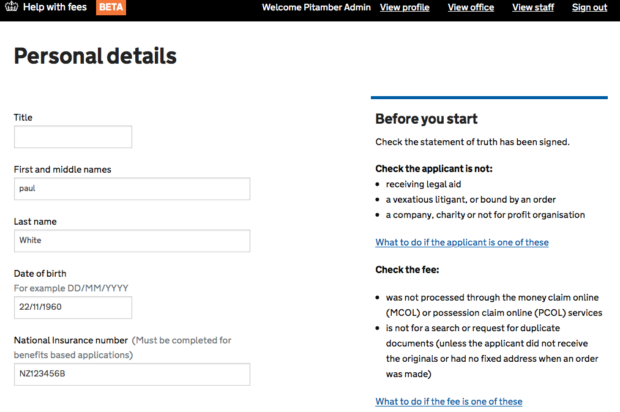How the right content has eased significant business change and helped to maintain quality control for court staff processing applications for help with fees.
Due to the sensitive nature of the work carried out by court and tribunal staff, Her Majesty’s Courts and Tribunals (HMCTS) provide rigorous training and quality controls to maintain quality and integrity.
This is something the team had to take into account when building the new service for staff to process applications for financial help with fees.
Building a service that that supports quality control
HMCTS have formalised quality control into a ‘standard operating procedure’ (SOP) which contains a number of key control checks (KCC) that staff must follow.
These KCCs are documented in series of ‘job cards’, step-by-step instructions for every element involved in processing an application.
Typically each one is a separate document that can be printed out for easy reference.
However, HMCTS discovered that the task of keeping job cards up-to-date can be daunting. Editing multiple documents, uploading them on the intranet and alerting staff to changes all takes time.
Often court staff would be referring to out-of-date information – either because they hadn’t printed the latest version, or the latest version didn’t yet reflect the most accurate information.
The new service addresses these issues by creating a single source of truth for key control checks. Not only is this much easier to keep up-to-date – but it’s integrated into the digital service so staff can view it on screen rather than referring to a separate document.

Supporting a major change
The new service was tested with approximately 36 court staff in 7 courts and tribunals before being rolled out more widely.
Staff taking part in the research haven’t been given any formal training, they’ve simply been asked to have a go at using it.
This has given us great insight into where people trip up and what they may have difficulty with.
We supported new users with contextual guidance as well as a short film that could be shown to court staff in their morning meetings.

There has been no formal training provided for using the new service, but over the space of 4-6 weeks, it was successfully rolled out to approximately 2,000 users.
Responding to staff feedback
Despite the fact that the new service represents a large change in the way that applications for help with fees are processed, staff have been able to adjust easily.
We analysed our dedicated email address for all support and help queries which showed that most questions from staff were about log in and policy issues – rather than how to use the new service.
This direct access to users queries means we can make changes and add additional guidance when necessary.
For example, we had several queries about whether evidence provided by applicants needed to be photocopied before being returned so we added information about this to the guidance. (The answer is ‘yes’).
One of the challenges we now face is striking the right balance between making sure staff can access all information they need, and not adding so much information that the guidance becomes too large and increasingly unusable.
So before we add anything, we check how many people have had a similar question. If it's only a small number then it probably isn't worth adding.
Have you had experience of introducing a new service that's led to big changes for staff? If so, we'd like to know about your experience or your thoughts on what we've done.
Don't miss out on future blog posts: sign up for email alerts.

Leave a comment